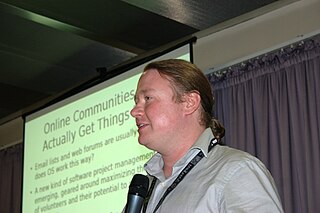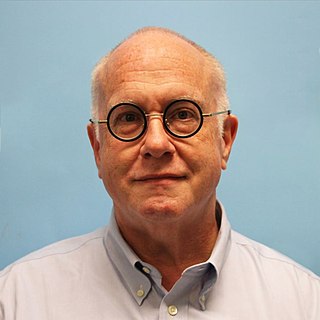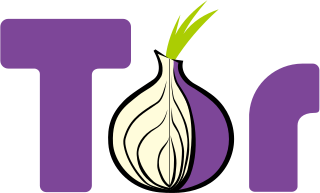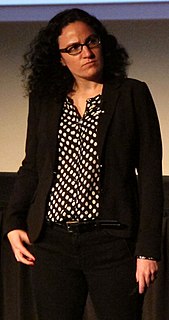
Bernstein v. United States is a set of court cases brought by Daniel J. Bernstein challenging restrictions on the export of cryptography from the United States.

Brian Behlendorf is an American technologist, executive, computer programmer and leading figure in the open-source software movement. He was a primary developer of the Apache Web server, the most popular web server software on the Internet, and a founding member of the Apache Group, which later became the Apache Software Foundation. Behlendorf served as president of the foundation for three years. Behlendorf has served on the board of the Mozilla Foundation since 2003 , Benetech since 2009 and the Electronic Frontier Foundation since 2013.
The Patent Busting Project is an Electronic Frontier Foundation (EFF) initiative challenging patents that the organization claims are illegitimate and suppress innovation or limit online expression. The initiative launched on April 19, 2004 and involves two phases: documenting the damage caused by these patents, and submitting challenges to the United States Patent and Trademark Office (USPTO).

European Digital Rights (EDRi) is an international advocacy group headquartered in Brussels, Belgium. EDRi was founded in June 2002 in Berlin by ten NGOs from seven countries. In March 2015, the European Council adopted a proposal that may compromise net neutrality, a major concern of EDRi.
The Investigative Data Warehouse (IDW), is a searchable database operated by the FBI. It was created in 2004. Much of the nature and scope of the database is classified. The database is a centralization of multiple federal and state databases, including criminal records from various law enforcement agencies, the U.S. Department of the Treasury's Financial Crimes Enforcement Network (FinCEN), and public records databases. According to Michael Morehart's testimony before the House Committee on Financial Services in 2006, the "IDW is a centralized, web-enabled, closed system repository for intelligence and investigative data. This system, maintained by the FBI, allows appropriately trained and authorized personnel throughout the country to query for information of relevance to investigative and intelligence matters."

The Digital Collection System Network (DCSNet) is the Federal Bureau of Investigation (FBI)'s point-and-click surveillance system that can perform instant wiretaps on almost any telecommunications device in the US.

Michael Wayne Godwin is an American attorney and author. He was the first staff counsel of the Electronic Frontier Foundation (EFF), and he created the Internet adage Godwin's law and the notion of an Internet meme, as reported in the October 1994 issue of Wired. From July 2007 to October 2010, he was general counsel for the Wikimedia Foundation. In March 2011 he was elected to the Open Source Initiative board. Godwin has served as a contributing editor of Reason magazine since 1994. He is currently general counsel and director of innovation policy at the R Street Institute.
The Electronic Frontier Foundation (EFF) is an international non-profit advocacy and legal organization based in the United States.

La Quadrature du Net is a French advocacy group that promotes digital rights and freedoms of citizens. It advocates for French and European legislation to respect the founding principles of the Internet, most notably the free circulation of knowledge. La Quadrature du Net engages in public-policy debates concerning, for instance, freedom of speech, copyright, regulation of telecommunications and online privacy.

Jewel v. National Security Agency is a United States class action lawsuit filed by the Electronic Frontier Foundation (EFF) against the National Security Agency (NSA) and several high-ranking officials in the administration of 43rd U.S. president George W. Bush, charging an "illegal and unconstitutional program of dragnet communications surveillance".

The Innovation Act of the 113th Congress is a bill that would change the rules and regulations surrounding patent infringement lawsuits in an attempt to reduce patent lawsuits.

The FISA Improvements Act is a proposed act by Senator Dianne Feinstein, Chair of the Senate Intelligence Committee. Prompted by the disclosure of NSA surveillance by Edward Snowden, it would establish the surveillance program as legal, but impose some limitations on availability of the data. Opponents say the bill would codify warrantless access to many communications of American citizens for use by domestic law enforcement.
HTTPS Everywhere is a free and open-source browser extension for Google Chrome, Mozilla Firefox, Opera, Brave, and Firefox for Android, which is developed collaboratively by The Tor Project and the Electronic Frontier Foundation (EFF). It automatically makes websites use a more secure HTTPS connection instead of HTTP, if they support it. The option "Block all HTTP requests" makes it possible to block and unblock all non-HTTPS browser connections with one click.

The Tor Project, Inc. is a Massachusetts-based 501(c)(3) research-education nonprofit organization founded by computer scientists Roger Dingledine, Nick Mathewson and five others. The Tor Project is primarily responsible for maintaining software for the Tor anonymity network.

Privacy Badger is a free and open-source browser extension for Google Chrome, Mozilla Firefox, Opera, and Firefox for Android created by the Electronic Frontier Foundation (EFF).
Let's Encrypt is a non-profit certificate authority run by Internet Security Research Group (ISRG) that provides X.509 certificates for Transport Layer Security (TLS) encryption at no charge. The certificate is valid for 90 days, during which renewal can take place at anytime. The offer is accompanied by an automated process designed to overcome manual creation, validation, signing, installation, and renewal of certificates for secure websites. It launched on April 12, 2016.

Marcia Clare Hofmann is an American attorney known for her work as an advocate of electronic privacy and free expression, including defending individuals charged with high-profile computer crimes.

A Machine Identification Code (MIC), also known as printer steganography, yellow dots, tracking dots or secret dots, is a digital watermark which certain color laser printers and copiers leave on every single printed page, allowing identification of the device with which a document was printed and giving clues to the originator. Developed by Xerox and Canon in the mid-1980s, its existence became public only in 2004. In 2018, scientists developed privacy software to anonymize prints in order to support whistleblowers publishing their work.











